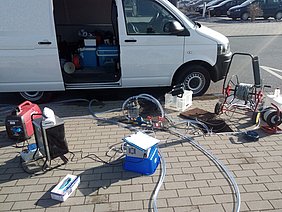Using molecular biological methods, additional information can be obtained to assess the microbial degradation of benzene, toluene, ethylbenzene and xylene (BTEX) at natural attenuation sites. The main objective of the investigations was to test PCR-based methods for the detection of functional gene segments of anaerobic BTEX degradation.
Aromatic hydrocarbons like benzene, toluene, ethylbenzene, xylenes (generally abbreviated as BTEX) represent a frequently occurring group of pollutants at contaminated sites. The main idea of the investigations was the idea, that the molecular biological detection of bacteria capable of degradation could provide additional knowledge on the degradation processes on top on microcosm experiments, MPN methods and isotope measurements. This is of particular interest with regards to natural attenuation as an option for contaminated site management.
Within the framework of the project, quantitative molecular biological methods for the detection of anaerobic BTEX-degrading microorganisms in groundwater samples were successfully established. The analysis of samples from different BTEX contaminated sites showed the presence of different gene sequences coding for specific enzymes of the benzoyl-CoA reductase degradation pathway.
Based on the knowledge gained, recommendations were given for the methodological approach - in particular the selection of the target sequences.
Publication
Müller A., Stange C., Tiehm A.: Neue molekularbiologische Methoden zum Nachweis des anaeroben BTEX-Abbaus. In: Kursunterlagen zum Seminar 01/2018 „Natural Attenuation (NA) in der Praxis der Altlastenbearbeitung“, Fortbildungsverbund Boden und Altlasten Baden-Württemberg, Karlsruhe 01. Feb 2018: 4/1-4/13 (2018)

![[Translate to English:] Prüfstelle-Produktprüfung_Teststand Test centre and product testing](/fileadmin/_processed_/0/9/csm_TZW-Karlsruhe_Pruefung_Geraete-Teststand_377188946c.jpg)
























